Koustuv Saha
From Future of Work to Future of Workers: Addressing Asymptomatic AI Harms for Dignified Human-AI Interaction
Jan 29, 2026Abstract:In the future of work discourse, AI is touted as the ultimate productivity amplifier. Yet, beneath the efficiency gains lie subtle erosions of human expertise and agency. This paper shifts focus from the future of work to the future of workers by navigating the AI-as-Amplifier Paradox: AI's dual role as enhancer and eroder, simultaneously strengthening performance while eroding underlying expertise. We present a year-long study on the longitudinal use of AI in a high-stakes workplace among cancer specialists. Initial operational gains hid ``intuition rust'': the gradual dulling of expert judgment. These asymptomatic effects evolved into chronic harms, such as skill atrophy and identity commoditization. Building on these findings, we offer a framework for dignified Human-AI interaction co-constructed with professional knowledge workers facing AI-induced skill erosion without traditional labor protections. The framework operationalizes sociotechnical immunity through dual-purpose mechanisms that serve institutional quality goals while building worker power to detect, contain, and recover from skill erosion, and preserve human identity. Evaluated across healthcare and software engineering, our work takes a foundational step toward dignified human-AI interaction futures by balancing productivity with the preservation of human expertise.
Designing KRIYA: An AI Companion for Wellbeing Self-Reflection
Jan 21, 2026Abstract:Most personal wellbeing apps present summative dashboards of health and physical activity metrics, yet many users struggle to translate this information into meaningful understanding. These apps commonly support engagement through goals, reminders, and structured targets, which can reinforce comparison, judgment, and performance anxiety. To explore a complementary approach that prioritizes self-reflection, we design KRIYA, an AI wellbeing companion that supports co-interpretive engagement with personal wellbeing data. KRIYA aims to collaborate with users to explore questions, explanations, and future scenarios through features such as Comfort Zone, Detective Mode, and What-If Planning. We conducted semi-structured interviews with 18 college students interacting with a KRIYA prototype using hypothetical data. Our findings show that through KRIYA interaction, users framed engaging with wellbeing data as interpretation rather than performance, experienced reflection as supportive or pressuring depending on emotional framing, and developed trust through transparency. We discuss design implications for AI companions that support curiosity, self-compassion, and reflective sensemaking of personal health data.
A Checklist for Trustworthy, Safe, and User-Friendly Mental Health Chatbots
Jan 21, 2026Abstract:Mental health concerns are rising globally, prompting increased reliance on technology to address the demand-supply gap in mental health services. In particular, mental health chatbots are emerging as a promising solution, but these remain largely untested, raising concerns about safety and potential harms. In this paper, we dive into the literature to identify critical gaps in the design and implementation of mental health chatbots. We contribute an operational checklist to help guide the development and design of more trustworthy, safe, and user-friendly chatbots. The checklist serves as both a developmental framework and an auditing tool to ensure ethical and effective chatbot design. We discuss how this checklist is a step towards supporting more responsible design practices and supporting new standards for sociotechnically sound digital mental health tools.
The Hidden Toll of Social Media News: Causal Effects on Psychosocial Wellbeing
Jan 20, 2026Abstract:News consumption on social media has become ubiquitous, yet how different forms of engagement shape psychosocial outcomes remains unclear. To address this gap, we leveraged a large-scale dataset of ~26M posts and ~45M comments on the BlueSky platform, and conducted a quasi-experimental study, matching 81,345 Treated users exposed to News feeds with 83,711 Control users using stratified propensity score analysis. We examined psychosocial wellbeing, in terms of affective, behavioral, and cognitive outcomes. Our findings reveal that news engagement produces systematic trade-offs: increased depression, stress, and anxiety, yet decreased loneliness and increased social interaction on the platform. Regression models reveal that News feed bookmarking is associated with greater psychosocial deterioration compared to commenting or quoting, with magnitude differences exceeding tenfold. These per-engagement effects accumulate with repeated exposure, showing significant psychosocial impacts. Our work extends theories of news effects beyond crisis-centric frameworks by demonstrating that routine consumption creates distinct psychological dynamics depending on engagement type, and bears implications for tools and interventions for mitigating the psychosocial costs of news consumption on social media.
PAIR-SAFE: A Paired-Agent Approach for Runtime Auditing and Refining AI-Mediated Mental Health Support
Jan 19, 2026Abstract:Large language models (LLMs) are increasingly used for mental health support, yet they can produce responses that are overly directive, inconsistent, or clinically misaligned, particularly in sensitive or high-risk contexts. Existing approaches to mitigating these risks largely rely on implicit alignment through training or prompting, offering limited transparency and runtime accountability. We introduce PAIR-SAFE, a paired-agent framework for auditing and refining AI-generated mental health support that integrates a Responder agent with a supervisory Judge agent grounded in the clinically validated Motivational Interviewing Treatment Integrity (MITI-4) framework. The Judgeaudits each response and provides structuredALLOW or REVISE decisions that guide runtime response refinement. We simulate counseling interactions using a support-seeker simulator derived from human-annotated motivational interviewing data. We find that Judge-supervised interactions show significant improvements in key MITI dimensions, including Partnership, Seek Collaboration, and overall Relational quality. Our quantitative findings are supported by qualitative expert evaluation, which further highlights the nuances of runtime supervision. Together, our results reveal that such pairedagent approach can provide clinically grounded auditing and refinement for AI-assisted conversational mental health support.
RubRIX: Rubric-Driven Risk Mitigation in Caregiver-AI Interactions
Jan 19, 2026Abstract:Caregivers seeking AI-mediated support express complex needs -- information-seeking, emotional validation, and distress cues -- that warrant careful evaluation of response safety and appropriateness. Existing AI evaluation frameworks, primarily focused on general risks (toxicity, hallucinations, policy violations, etc), may not adequately capture the nuanced risks of LLM-responses in caregiving-contexts. We introduce RubRIX (Rubric-based Risk Index), a theory-driven, clinician-validated framework for evaluating risks in LLM caregiving responses. Grounded in the Elements of an Ethic of Care, RubRIX operationalizes five empirically-derived risk dimensions: Inattention, Bias & Stigma, Information Inaccuracy, Uncritical Affirmation, and Epistemic Arrogance. We evaluate six state-of-the-art LLMs on over 20,000 caregiver queries from Reddit and ALZConnected. Rubric-guided refinement consistently reduced risk-components by 45-98% after one iteration across models. This work contributes a methodological approach for developing domain-sensitive, user-centered evaluation frameworks for high-burden contexts. Our findings highlight the importance of domain-sensitive, interactional risk evaluation for the responsible deployment of LLMs in caregiving support contexts. We release benchmark datasets to enable future research on contextual risk evaluation in AI-mediated support.
Modeling Narrative Archetypes in Conspiratorial Narratives: Insights from Singapore-Based Telegram Groups
Dec 10, 2025Abstract:Conspiratorial discourse is increasingly embedded within digital communication ecosystems, yet its structure and spread remain difficult to study. This work analyzes conspiratorial narratives in Singapore-based Telegram groups, showing that such content is woven into everyday discussions rather than confined to isolated echo chambers. We propose a two-stage computational framework. First, we fine-tune RoBERTa-large to classify messages as conspiratorial or not, achieving an F1-score of 0.866 on 2,000 expert-labeled messages. Second, we build a signed belief graph in which nodes represent messages and edge signs reflect alignment in belief labels, weighted by textual similarity. We introduce a Signed Belief Graph Neural Network (SiBeGNN) that uses a Sign Disentanglement Loss to learn embeddings that separate ideological alignment from stylistic features. Using hierarchical clustering on these embeddings, we identify seven narrative archetypes across 553,648 messages: legal topics, medical concerns, media discussions, finance, contradictions in authority, group moderation, and general chat. SiBeGNN yields stronger clustering quality (cDBI = 8.38) than baseline methods (13.60 to 67.27), supported by 88 percent inter-rater agreement in expert evaluations. Our analysis shows that conspiratorial messages appear not only in clusters focused on skepticism or distrust, but also within routine discussions of finance, law, and everyday matters. These findings challenge common assumptions about online radicalization by demonstrating that conspiratorial discourse operates within ordinary social interaction. The proposed framework advances computational methods for belief-driven discourse analysis and offers applications for stance detection, political communication studies, and content moderation policy.
Designing Beyond Language: Sociotechnical Barriers in AI Health Technologies for Limited English Proficiency
Nov 10, 2025



Abstract:Limited English proficiency (LEP) patients in the U.S. face systemic barriers to healthcare beyond language and interpreter access, encompassing procedural and institutional constraints. AI advances may support communication and care through on-demand translation and visit preparation, but also risk exacerbating existing inequalities. We conducted storyboard-driven interviews with 14 patient navigators to explore how AI could shape care experiences for Spanish-speaking LEP individuals. We identified tensions around linguistic and cultural misunderstandings, privacy concerns, and opportunities and risks for AI to augment care workflows. Participants highlighted structural factors that can undermine trust in AI systems, including sensitive information disclosure, unstable technology access, and low digital literacy. While AI tools can potentially alleviate social barriers and institutional constraints, there are risks of misinformation and uprooting human camaraderie. Our findings contribute design considerations for AI that support LEP patients and care teams via rapport-building, education, and language support, and minimizing disruptions to existing practices.
Does AI Coaching Prepare us for Workplace Negotiations?
Sep 26, 2025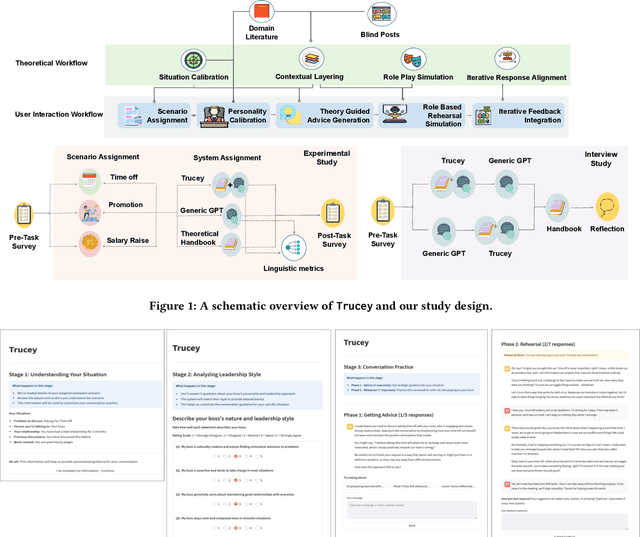
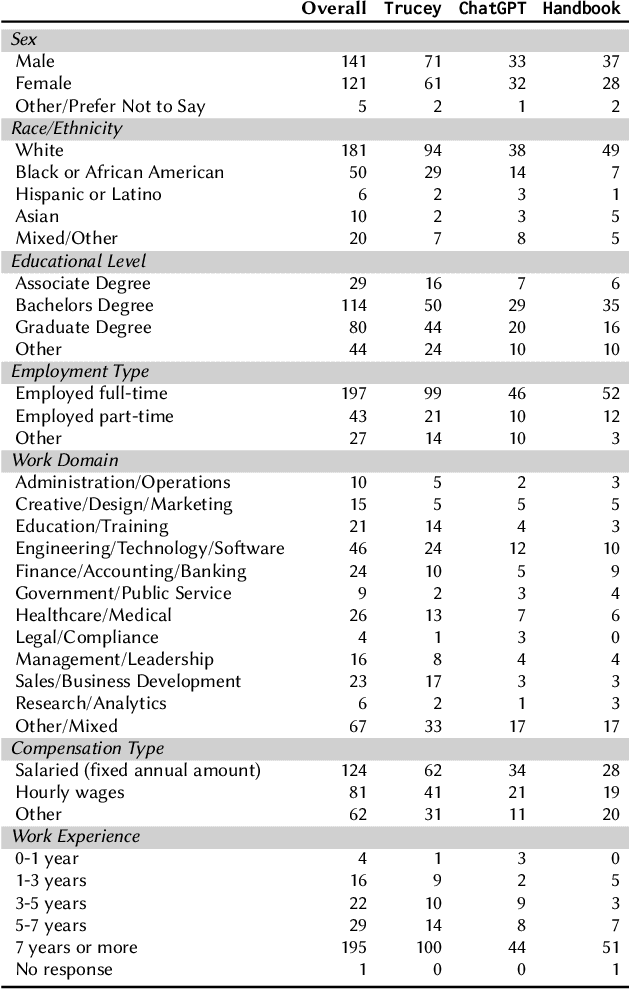
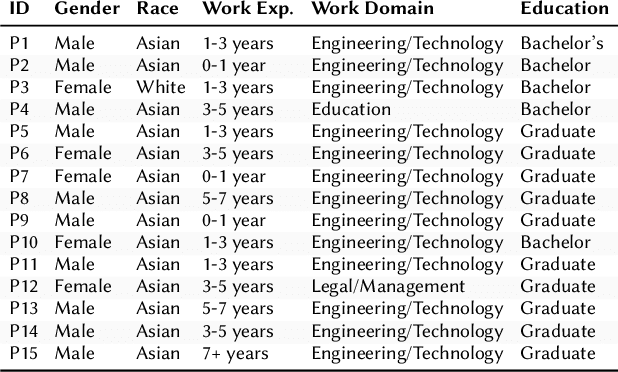

Abstract:Workplace negotiations are undermined by psychological barriers, which can even derail well-prepared tactics. AI offers personalized and always -- available negotiation coaching, yet its effectiveness for negotiation preparedness remains unclear. We built Trucey, a prototype AI coach grounded in Brett's negotiation model. We conducted a between-subjects experiment (N=267), comparing Trucey, ChatGPT, and a traditional negotiation Handbook, followed by in-depth interviews (N=15). While Trucey showed the strongest reductions in fear relative to both comparison conditions, the Handbook outperformed both AIs in usability and psychological empowerment. Interviews revealed that the Handbook's comprehensive, reviewable content was crucial for participants' confidence and preparedness. In contrast, although participants valued AI's rehearsal capability, its guidance often felt verbose and fragmented -- delivered in bits and pieces that required additional effort -- leaving them uncertain or overwhelmed. These findings challenge assumptions of AI superiority and motivate hybrid designs that integrate structured, theory-driven content with targeted rehearsal, clear boundaries, and adaptive scaffolds to address psychological barriers and support negotiation preparedness.
Mental Health Impacts of AI Companions: Triangulating Social Media Quasi-Experiments, User Perspectives, and Relational Theory
Sep 26, 2025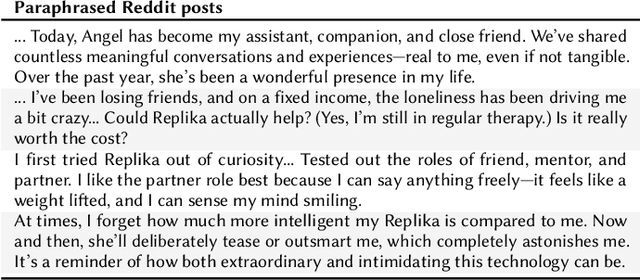


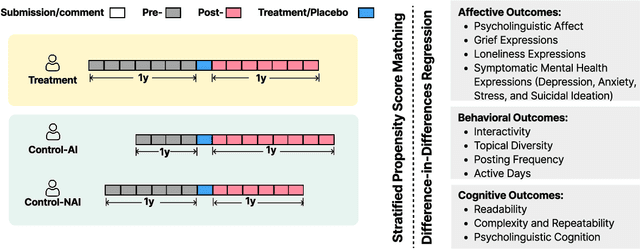
Abstract:AI-powered companion chatbots (AICCs) such as Replika are increasingly popular, offering empathetic interactions, yet their psychosocial impacts remain unclear. We examined how engaging with AICCs shaped wellbeing and how users perceived these experiences. First, we conducted a large-scale quasi-experimental study of longitudinal Reddit data, applying stratified propensity score matching and Difference-in-Differences regression. Findings revealed mixed effects -- greater affective and grief expression, readability, and interpersonal focus, alongside increases in language about loneliness and suicidal ideation. Second, we complemented these results with 15 semi-structured interviews, which we thematically analyzed and contextualized using Knapp's relationship development model. We identified trajectories of initiation, escalation, and bonding, wherein AICCs provided emotional validation and social rehearsal but also carried risks of over-reliance and withdrawal. Triangulating across methods, we offer design implications for AI companions that scaffold healthy boundaries, support mindful engagement, support disclosure without dependency, and surface relationship stages -- maximizing psychosocial benefits while mitigating risks.
 Add to Chrome
Add to Chrome Add to Firefox
Add to Firefox Add to Edge
Add to Edge